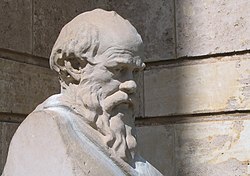
Back Intel·lectualisme moral socràtic Catalan Intelectualismo moral Spanish Ёс суртахууны ухаан Mongolian Intelektualizm etyczny Polish اخلاقي عقلانيزم Pashto/Pushto سقراطي عقليت پسندي Sindhi 倫理知識論 Chinese
| Part of a series on |
| Socrates |
|---|
 |
| Eponymous concepts |
| Pupils |
| Related topics |
|
|
Moral intellectualism or ethical intellectualism is a view in meta-ethics according to which genuine moral knowledge must take the form of arriving at discursive moral judgements about what one should do.[1] One way of understanding this is that doing what is right is a reflection of what any being knows is right.[2] However, it can also be interpreted as the understanding that a rationally consistent worldview and theoretical way of life, as exemplified by Socrates, is superior to the life devoted to a moral (but merely practical) life.[citation needed]
- ^ Adams, Zed (2014). "Against Moral Intellectualism". Philosophical Investigations. 37 (1): 37–56. doi:10.1111/phin.12025. ISSN 1467-9205.
- ^ The Moral Intellectualism of Plato's Socrates The Case of the Hippias Minor